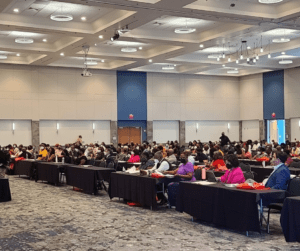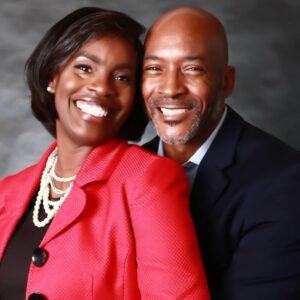By Catherine Komp,
Newsletter Editor
In a reflection on last week’s Knight Media Forum, S. Mitra Kalita shared highlights from the opening panel about “Empowering Local Journalism.”
“Execution is not our problem; it’s the absolute reinvention of what news actually is and what it means in people’s lives. Only then might we be valued in the same manner as a Hulu or Netflix subscription,” wrote Kalita.
The CEO of Epicenter NYC and URL Media also explained why she often cites Frederick Douglas when talking about local news.
“This repetition is intentional,” said Kalita. “Douglass’ newspapers helped readers escape slavery, access healthcare and browse ads to reconnect with loved ones. This idea of the press operating in service to our communities is nothing new, my co-founder Sara Lomax, who has innovated for four decades in Black media, has taught me.”
Here in North Carolina, that combination of service to community and filling information gaps is happening in numerous parts of the state. WNC Health Network runs a “Communicators Collaborative,” makes local and regional health data more accessible, and works to amplify people most affected by health issues. In Central NC, the Refugee Community Partnership launched the Hive to provide new arrival and migrant populations with communications from local government and news translated into their own languages. And in Eastern NC, Dr. Dawn Baldwin Gibson and her late husband Anthony Gibson created the Peletah Institute for Building Resilient Communities. The Institute partners with dozens of local, regional and state agencies and organizations to put on “Resiliency Collaborative” events, including one last week, to provide the community with resources on health, education, housing, disaster preparedness and more.
“Watching the news can be traumatic and it is traumatic for people,” said Gibson. “So how do we build this sense of hopefulness in a world that feels really hopeless for a lot of people. The Resiliency Collaboratives are exactly that, it is bringing people together who have resources, who have the opportunity to connect.”
A Faithful Steward
Since founding Peletah Ministries in 2011, the Gibsons have provided vital disaster recovery relief from Hurricanes Matthew, Irene and Florence. They brought trauma-informed approaches to their church and the Peletah Academic Center for Excellence (PACE), their PK-12 private school. During the height of COVID-19, they partnered with other churches to provide accurate information, dispel myths and connect people with tests, vaccines, rental assistance and other resources. They hosted the NC Legislative Black Caucus Poverty Summit and partnered with the City of New Bern to host a Racial Reconciliation Conference.
“What I’ve always said is that whatever is in the community at the time of the disaster, it is only amplified by the disaster. So if poverty is already the issue that we’re facing and grappling with, it’s going to be amplified. If we’re having challenges to racial and oppressive systems, it is going to be amplified,” said Gibson. “So when we’re starting to talk about resilience, it’s really thinking about how do we build those infrastructures and resiliency throughout Eastern North Carolina.”

Black churches have long been trusted messengers of news and information in their communities. The Gibsons also have deep family roots in the region; Dawn’s traced her family history there back 300 years. Her maternal grandfather, whose parents were enslaved, spent 70 of his 93 years as a deacon of the same local church.
“My husband and I come from that same tradition. We met in a church, we courted in a church. So for both of us, it has always been about making sure that these trusted anchor institutions are held and supported,” said Gibson.
Bridging Community and Local News
With the trust that the Gibsons built in New Bern and beyond, Dawn saw an opportunity when her friend Randy Foster, the founder of the New Bern Post, said he was moving out of the area and needed to shut the news site down.
“I said ‘No, don’t do that! Don’t do that!,” recalls Gibson, who has had a passion for journalism since her undergrad at Shaw University. They offered to buy the news site and in October 2021, Foster transferred ownership to them. The plan was for the site to be a part of the PACE school, which would train students and community members to cover local news and information.
“We now call it the ENC Post, but we’ve kind of been in this state, like, “Are we reporting the news or are we kind of making news? I mean, what are we doing here?” said Gibson.
The initial community response was positive. People reached out with story leads and interest in becoming citizen journalists. They had the expertise of their son Spencer Baldwin II, who previously worked for the New Bern Sun Journal. They partnered with UNC’s Center for Innovation and Sustainability in Local Media on a community journalism training.
But there have been significant challenges since then. The Gibson’s lost five family members to COVID shortly after taking over the site. Dawn’s husband Anthony began to have health issues and last Fall, he passed away at the age of 59. Dawn took on the role of executive director and executive pastor at Peletah Ministries and Spencer is the principal of the PACE school.

“We are really trying to think through what we need to be doing, but we’re thinking that we need to be doing something,” she said. “This year I believe is probably going to be one of the most important, maybe of our lifetime.”
Gibson says they’d like to retool ENC Post into a sustainable news model, but they do already have an eager team of young people to contribute to the site.
“They are ready, they want to do this work of digital storytelling and reporting,” said Gibson. “They have this vision and they have the go-get-it. And there’s a language they’re speaking to their generation that we need.”
Gibson said they welcome support in getting ENC Post back off the ground, including guidance on sustainability, assistance with training and tech resources for the student journalists.
In this moment of existential threats to the climate and democracy, Gibson says there’s a bigger role they can play by positioning the ENC Post to serve the community with more trusted news and information.
“I don’t want to be looking back in five years and say, ‘You know what, if we had maybe done a little bit more to protect democracy, that maybe what we see now, we wouldn’t see,’” said Gibson. “We feel like history is calling us to do.”



